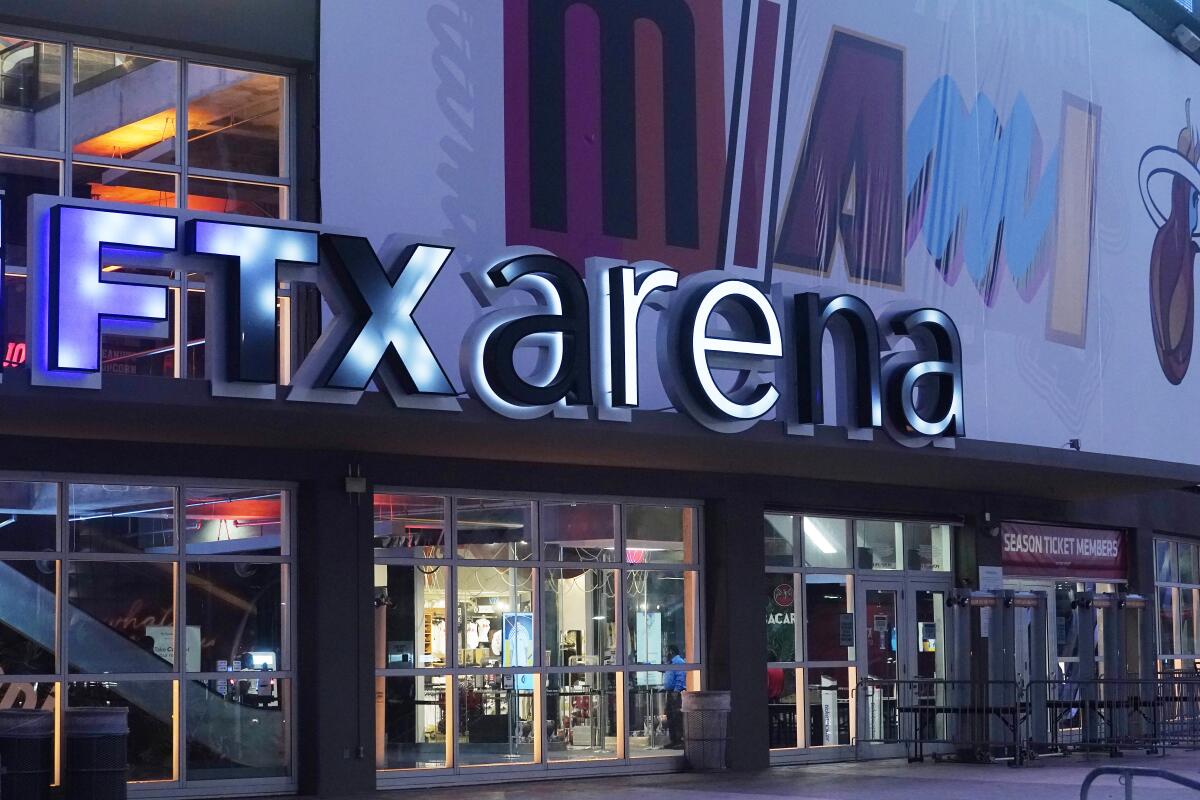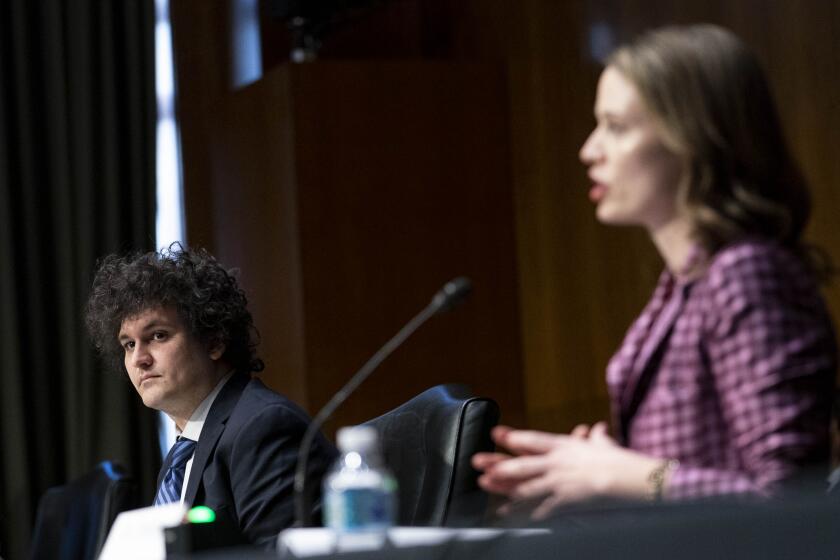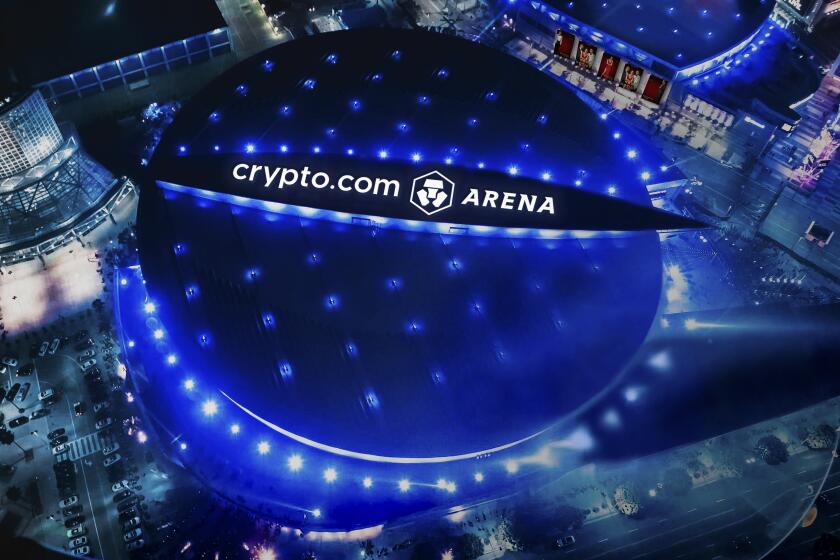FTX’s downfall casts a shadow over other sports-rights deals. What’s up, Crypto.com Arena?

- Share via
When the Miami Heat announced in March 2021 that the team had sold naming rights for its arena to FTX, the response from sports fans was a resounding: Who?
In the year and a half since, the Bahamas-based cryptocurrency exchange has become ubiquitous in the sports world. Its name was on the uniforms of Major League Baseball umpires. It had a partnership with the Mercedes-Benz Formula One team and deals with four professional sports teams and some of the world’s most prominent athletes.
The collapse of all that took about a week. After FTX Group filed for Chapter 11 bankruptcy amid reports of insolvency and misuse of customer funds, Miami-Dade County, which owns the arena the Heat play in, said it would “terminate our business relationships with FTX” and seek a new naming rights partner.
Team SoloMid, one of the biggest names in online gaming as a spectator sport, dropped its 10-year, $210-million sponsorship and naming rights deal with FTX. It had used the name TSM FTX since inking that deal last year.
In California, UC Berkeley suspended its $17.5-million naming rights deal with FTX and removed the FTX logos from both of the 25 yard lines of California Memorial Stadium. The planned 10-year agreement didn’t even last 18 months.
Before crypto prices began tumbling a year ago, and even for months afterward, the sector’s biggest companies viewed sports marketing as a key avenue to building consumer awareness and claiming market share for their hard-to-understand, seemingly interchangeable offerings.
In November 2021, just days after bitcoin’s price hit its all-time high, AEG Worldwide struck a deal with Crypto.com to rename Staples Center, home of the Los Angeles Lakers. The deal was valued at $700 million, according to sources with knowledge of the terms.
Two months later, with the market already firmly in bear territory, several crypto companies spent big on Super Bowl ads. Binance, the cryptocurrency exchange whose owner’s machinations played a role in bringing down FTX, hired basketball star Jimmy Butler to appear in a spot warning viewers to be wary of celebrity crypto ads. Binance also became an official sponsor of the African Cup of Nations soccer tournament.
In May, six months into the crypto downturn, the WNBA’s Seattle Storm announced a multiyear partnership with Coinbase, making it the franchise’s official cryptocurrency platform.
Now, with FTX’s implosion stoking fresh fears about a domino-like run on exchanges and currencies, the decision by major sports entities to hitch their brands to crypto companies is coming in for fresh scrutiny.
“Any time you enter into a long-term deal, you obviously need to assess the financial wherewithal or creditworthiness of your counterpart,” said Irwin Kishner, co-chair of the sports group at the New York law firm Herrick Feinstein. “The obvious question is: ‘What’s the long-term viability of crypto as a product group and its ability to make its committed payments?’”
Sam Bankman-Fried’s $16-billion fortune was always a myth. The mystery is why venture firms and the financial press thought it existed.
The answer to that question, he said, is “anybody’s guess.”
The deal that saw Staples Center rebranded as Crypto.com Arena was one of the most expensive in stadium rights history. It came after AEG, a global sporting and music entertainment presenter that is a subsidiary of Anschutz Corp. in Denver, bought the naming rights back from Staples in 2019 for an undisclosed sum. In addition to the Lakers, the venue is home to the Los Angeles Kings hockey team and, until their own facility is finished, the Los Angeles Clippers.
AEG said this week that it has “all the faith and confidence in the world” in Crypto.com’s ability to honor its agreement. Late Wednesday it expanded on that statement, saying, “AEG has enjoyed its engagement with the arena’s title sponsor, and the benefits they have provided our fans, athletes, and performers. Crypto.com has continued to be valuable and collaborative partners with us on various arena initiatives and care about extolling the value of our product and enhancing the fan’s experience.”
Revelations that FTX lent billions of dollars’ worth of user funds to Alameda Research, a trading firm controlled by FTX founder Sam Bankman-Fried, have cast suspicions on the entire sector, which has been an unregulated Wild West compared with Wall Street, and invited questions about how intermingled its finances were with other exchanges and coin issuers. John Ray III, the new chief executive brought in to oversee FTX’s bankruptcy, said he had never seen such a complete failure of governance or corporate controls.
Matt David, chief communications officer for Crypto.com, said the company “runs a very conservative business focused on compliance and security. We do not leverage customer funds.”
The Staples Center will become known as Crypto.com Arena as part of a new 20-year deal between the Singapore cryptocurrency exchange and AEG, owner of the home arena of the Los Angeles Lakers, Clippers, Kings and Sparks.
David said that Cypto.com had “an immaterial amount of exposure to FTX. We did over a billion dollars in revenue last year and have already done over a billion dollars in revenue this year. We have a very strong balance sheet and are 100% committed to our sports partnerships, including Crypto.com Arena. These partnerships have played a key role in increasing our user numbers to over 70 million globally.”
The parties that sell naming rights aren’t obligated to honor their agreements when things go awry, said David Carter, executive director of the USC Sports Business Institute. In 2002, the Houston Astros baseball team was able to buy its way out of a $100-million, 30-year deal to call its ballpark Enron Field with a $2.1-million settlement. Enron was the Texas energy, commodities, and services company that imploded amid criminal convictions and scandals. (Ray, the new FTX CEO, was the executive tasked with cleaning up the mess at Enron.)
PSINet Stadium, home of the Baltimore Ravens football team, reverted back to Ravens Stadium after PSINet, one of the first commercial internet service providers, went bankrupt. It’s now the M&T Bank Stadium.
Walmart heiress Paige Laurie’s name was scratched from the stadium her parents had donated at the University of Missouri after she was accused of cheating her way through USC. The Sackler family, owners of the company that made the much maligned opioid Oxycontin, had its name removed from seven exhibition spaces by the Metropolitan Museum of Art. The Louvre museum in Paris did the same in 2019.
“We‘ve seen it happen before and it will happen again,” Carter said. “What might be a little bit different this time around is how rapidly the crypto industry grew and how fast they became a very important marketing partner to so many in and around the sports space.”
Baird Fogel, a partner at the San Francisco office of law firm Eversheds Sutherland who focuses on the sports industry and on renewable energy, said naming rights agreements often contain a morality clause in case of major problems “because whenever you enter into some sort of sponsorship arrangement, for better or for worse, you’re tying yourself to that entity and that organization. Your reputations are now aligned. It takes a very long time to build a good reputation and about five minutes to destroy it.”
But for all of the hundreds of millions of dollars poured into naming rights agreement in the last two decades, there seems to have been little effect beyond higher name recognition or perhaps an increased sense of legitimacy. When it comes to financial gains from the purchase of naming rights, there mostly aren’t any, said Michael Leeds, a professor of economics at Temple University, who co-wrote a study of 53 naming rights deals in 2007.
“Only three of the companies or entities that bought those rights gained big profits above and beyond what they were tracking before the deal or saw a jump in their stock price,” Leeds said. “The huge majority of those deals didn’t move the needle at all.”
More to Read
Inside the business of entertainment
The Wide Shot brings you news, analysis and insights on everything from streaming wars to production — and what it all means for the future.
You may occasionally receive promotional content from the Los Angeles Times.













